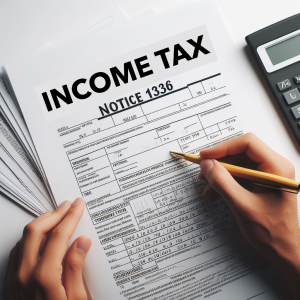 What Is Section 133(6) Of The Income Tax Act?
What Is Section 133(6) Of The Income Tax Act?
Section 133(6) of the Income Tax Act serves as a pivotal mechanism for the Indian tax authorities to gather necessary information. This provision empowers tax officials to requisition details from any individual or entity that may be relevant to any proceeding under the Act. Unlike other sections that target specific taxpayers, Section 133(6) casts a wider net, allowing for the collection of information from a broader audience, including banks, financial institutions, and companies. This information-gathering tool aids in maintaining the integrity of the tax system, ensuring compliance and uncovering potential tax evasion.
Time Limits Under Section 133(6) Of The Income Tax Act
Timeliness is a crucial aspect of the compliance process under Section 133(6). Typically, the recipient of a notice under this section is required to furnish the requested information within the timeframe specified in the notice itself. This period can vary depending on the nature of the information requested and the discretion of the issuing authority. However, it generally ranges from a few days to several weeks. It’s imperative for the recipient to adhere strictly to this deadline, as any delay can result in unwarranted scrutiny or penalties. Extensions may be granted under certain circumstances, but these are exceptions rather than the rule.
Consult CA Arun Tiwari for more information at 📞 8080088288 or cs@aktassociates.com
Case Laws For Section 133(6) Of The Income Tax Act
Consider these examples to understand the application of Section 133(6):
- Case 1: Mr. Amit purchased goods worth Rs. 10 lakh from Mr. Venkatesh but failed to disclose the transaction details in his tax filing. If selected for scrutiny, Mr. Amit may receive a notice under Section 133(6) to provide transaction details, including invoices, and update his returns if necessary.
- Case 2: Mr. Nitish, an Indian citizen until FY2021, moved to the USA but continued earning from investments in India without filing an ITR. He may receive a notice under Section 133(6) to submit bank and demat statements showing his income in both countries. Failure to comply within 20 days can result in penalties.
Who Can Issue Notices Under Section 133(6) Of The Income Tax Act?
Notices under Section 133(6) can be issued by a range of tax authorities, reflecting the section’s broad applicability. This includes the Assessing Officer, the Commissioner of Income Tax (CIT), and the Director of Income Tax (DIT). These officials have the authority to issue notices to individuals, businesses, and other entities as part of their investigative and assessment duties. The purpose of these notices is to collect data that can support ongoing assessments or investigations, ensuring that the tax authorities have a comprehensive understanding of the taxpayer’s financial situation.

How To Respond To Notices Under Section 133(6) Of The Income Tax Act?
Receiving a notice under Section 133(6) can be daunting, but a measured and timely response is crucial. Upon receipt, carefully review the notice to understand the specific information requested. Gather the required documents and data meticulously, ensuring accuracy and completeness. It’s advisable to consult with a tax professional to ensure that the response aligns with legal requirements and addresses all aspects of the notice. Once the information is compiled, submit it within the specified deadline, preferably in a documented format that confirms receipt by the tax authorities.
Tips For Filing A Response
- Thorough Review: Scrutinize the notice to understand every detail of the requested information.
- Accurate Documentation: Ensure all data and documents are accurate, complete, and relevant.
- Professional Assistance: Engage a tax consultant or legal advisor for expert guidance.
- Timely Submission: Adhere strictly to the deadline provided in the notice to avoid penalties.
- Record Keeping: Maintain copies of the submitted information and proof of submission for future reference.
Penalties For Non-Compliance Under Section 133(6) Of The Income Tax Act
Non-compliance with a notice issued under Section 133(6) can lead to severe repercussions. The tax authorities are empowered to impose penalties on individuals or entities that fail to furnish the requested information within the stipulated timeframe. This can include monetary fines, which vary based on the nature and extent of the default. In certain cases, continued non-compliance may also attract prosecution under the Income Tax Act. Therefore, it is crucial to treat notices under this section with the utmost seriousness and ensure prompt and complete compliance.
Conclusion
Section 133(6) of the Income Tax Act is a vital instrument for tax authorities to ensure transparency and compliance within the tax system. By understanding the nuances of this provision, including the types of authorities empowered to issue notices, the importance of timely and accurate responses, and the potential penalties for non-compliance, taxpayers can better navigate the complexities of tax regulations. Proactive engagement and adherence to guidelines not only prevent penalties but also foster a smoother and more cooperative relationship with the tax authorities.

